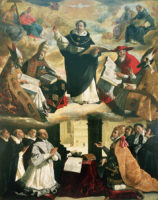
The Writings of the Angelic Doctor
Dr. James Dolezal joins Dr. Stephen Nichols in the studio to discuss the breadth and depth of Thomas Aquinas’ writings.
Stephen Nichols (SN): Today, we are going back to the 1200s, and once again, we are joined by Dr. James Dolezal. Dr. Dolezal, it’s good to see you again.
James Dolezal (JD): Good to be here again.
SN: Dr. Dolezal is a professor at Cairn University. He teaches theology, history, and philosophy. He has recently written a wonderful book called All That Is in God. In that book, you reference a particular figure from the 1200s, who has been very formative on your thought. Of course, we’re talking about Thomas Aquinas.
 JD: Yes. Thomas Aquinas perhaps isn’t on the shortlist of favorite theologians among Protestants nowadays, though he was a formidable influence on Protestant and Reformed thinkers in the seventeenth century. Thomas was a Dominican monk who lived from 1225 to about 1274.
JD: Yes. Thomas Aquinas perhaps isn’t on the shortlist of favorite theologians among Protestants nowadays, though he was a formidable influence on Protestant and Reformed thinkers in the seventeenth century. Thomas was a Dominican monk who lived from 1225 to about 1274.
SN: He’s spanning most of the 1200s then. Sometimes he’s called the “Angelic Doctor.” That’s quite a title.
JD: No one has called me that.
SN: Well, there’s still time. One of the things I wanted to talk to you about is the writings of Thomas Aquinas. He had a phenomenal literary output, not only in terms of its depth, but also in the variety of things he was writing. What are some of the writings of Thomas Aquinas?
JD: Thomas wrote many different kinds of things, all of them maybe very deep but surprising in their breadth. Thomas was not primarily a philosopher, though we often think of him as a philosopher.
SN: That’s what I would label him.
JD: His day job was not teaching philosophy. As a Doctor of Sacred Theology, he was teaching theology. With regard to his philosophical output, we might think of a small early treatise like “On Being and Essence,” in which he offered an argument for God, an apologetic. He also wrote commentaries on different writers— commentaries on some of the early church fathers, on Boethius, and on Peter Lombard’s Sentences, which was a standard rite of passage for anyone entering the teaching profession. These are some of his earlier works and the commentary on Lombard’s Sentences is one of his most extensive and important early works.
In addition to writing commentaries on theologians, he also wrote a number of commentaries on the works of Aristotle, and we can see the influence of Aristotle even in his theological works. In addition to that, he wrote a series of Disputed Questions. These were really based on his work as a professor, in which he would dispute issues in theology with some of his students, and then the questions and challenges and answers to those challenges would be recorded. If you want the heavy lifting of Thomas Aquinas theologically, it’s in his disputed questions on the soul, on evil, on the power of God, on virtue, and on truth. But his best known works are Summa contra Gentiles and the Summa Theologica, which is his magnum opus.
Readers should remember, these “summae” are summaries. The Disputed Questions are where the longer discussions take place. In addition to this, Thomas also has a long history of literal commentaries on books of the Bible where he comments, verse-by-verse, through all of the Pauline epistles, the gospel of Matthew, the gospel of John, as well as the book of Job. I think these are probably the most neglected in Thomas’ corpus.
SN: Interesting. We have his writings on philosophy, on theology, apologetics, and on these biblical books. This really is the “Angelic Doctor,” Thomas Aquinas.
JD: Yes, indeed.
SN: Thank you for giving us that overview of Thomas’ writings and an awareness of the breadth and depth of what he had to say. Thank you, Dr. Dolezal.
JD: Glad to be here. Thank you for having me.
Stay connected with 5 Minutes in Church History by getting the weekly podcast on iTunes, SoundCloud, or via RSS. You can also subscribe to the blog via RSS and follow us on Twitter and Facebook.
(This podcast is by Ligonier Ministries. Discovered by Christian Podcast Central and our community — copyright is owned by the publisher, not Christian Podcast Central, and audio is streamed directly from their servers.)